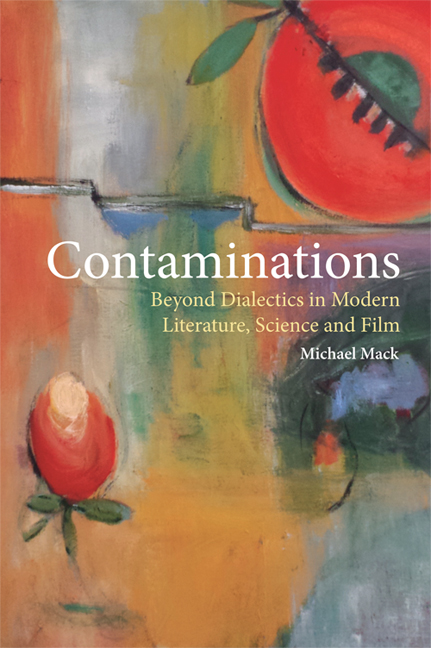Book contents
- Frontmatter
- Contents
- Acknowledgements
- Dedication
- Introduction: Climate Change and the Contamination of the Anthropocene
- 1 Contaminating Psychology with Biology: Descartes, Spinoza, Freud and Žižek
- 2 Contaminating the Visible with the Invisible: From Einstein via H. G. Wells to Hannah Arendt, Luhmann and Derrida
- 3 Contamination of Nature with Society: The Collapse of Natural Order from Melville to Wells and Ellison
- 4 Contaminating Judgement with its Suspension: Guilt and Punishment in Walter Benjamin, Herman Melville and Henry James
- 5 Contaminating the Digital: Action and Perception in Henry James and Alfred Hitchcock
- 6 Contaminating the Sacred with the Profane: Pier Paolo Pasolini and Biopolitics
- 7 Contaminating Posthumanism
- Bibliography
- Index
4 - Contaminating Judgement with its Suspension: Guilt and Punishment in Walter Benjamin, Herman Melville and Henry James
Published online by Cambridge University Press: 05 August 2016
- Frontmatter
- Contents
- Acknowledgements
- Dedication
- Introduction: Climate Change and the Contamination of the Anthropocene
- 1 Contaminating Psychology with Biology: Descartes, Spinoza, Freud and Žižek
- 2 Contaminating the Visible with the Invisible: From Einstein via H. G. Wells to Hannah Arendt, Luhmann and Derrida
- 3 Contamination of Nature with Society: The Collapse of Natural Order from Melville to Wells and Ellison
- 4 Contaminating Judgement with its Suspension: Guilt and Punishment in Walter Benjamin, Herman Melville and Henry James
- 5 Contaminating the Digital: Action and Perception in Henry James and Alfred Hitchcock
- 6 Contaminating the Sacred with the Profane: Pier Paolo Pasolini and Biopolitics
- 7 Contaminating Posthumanism
- Bibliography
- Index
Summary
Introduction: Agamben, Benjamin and the contamination of modernity
Natural philosophy or, in other words, traditional science and some strands within literary criticism have been preoccupied with the exploration of orders and patterns – establishing clear but often spurious boundaries between genres such as comedy and tragedy and between life worlds such as society and nature.
Scientists and natural philosophers set out to discover order in nature. According to Bruno Latour, this traditional concern with nature's order informs our modern conception of science. As proof of this persistent privileging of pure categorisations and classifications Latour discusses what he calls a modern division between the assumed perfection of nature and the unpredictability of human society and psychology. Constructions of a virtuous or perfected society – and this equally holds true for socio-economic blueprints derived from either a conservative or revolutionary ambience – took this traditional scientific conception of a natural order as the model for various social theories and practices, from the French revolution's quasi-natural disposition of the sentiment of virtue to the counter-revolutionary categorisation of social hierarchies. Economics is a key social science in this context, because it transposes notions of natural order onto a homogeneous conception of society: one that mirrors the mentally constructed order of nature. Society here turns into a mental model of nature which is posited to be ordered, governmental, or, in contemporary parlance, ‘manageable’.
In his recent study The Kingdom and the Glory, Giorgio Agamben goes so far to argue that ‘modern biopolitics up to the current triumph of economy and government over every other aspect of social life’ can be traced to what he calls an ‘economic theology, which replaces’ political theology's ‘transcendence of sovereign power’ (i.e. God as sovereign) ‘with the idea of an oikonomia, conceived as an immanent ordering’ (Agamben 2012: 1). The notion ‘biopolitics’ here describes the imposition of a quasi-scientific order of nature onto the ethical–political core of human sociability. The reference to Homo Sacer in the subtitle of The Kingdom and the Glory limns the centrality of biopower in this discussion of a theology turned immanent that pervades modern economic discourse and practice, and which Bernard Harcourt has recently analysed as the illusion or myth of ‘free markets’ (as has been discussed in Chapter 3).
- Type
- Chapter
- Information
- ContaminationsBeyond Dialectics in Modern Literature, Science and Film, pp. 107 - 128Publisher: Edinburgh University PressPrint publication year: 2016



